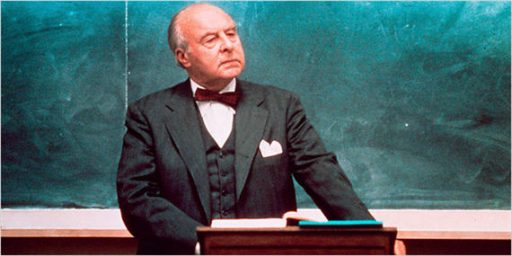Law School Grade Inflation
Eugene Volokh notes that there has been significant grade inflation at UCLA and other top law schools in recent years but makes a persuasive case that it is not all that problematic.
I think that’s right. Students at professional and graduate school tend to be quite bright and have demonstrated both through their interest in higher education and their selection to a particular school a rather high aptitude in their chosen field. The idea that a large number of law students should arbitrarily get “C” grades because of a pre-determined curve strikes me as silly.
Most PhD programs essentially have a tripartite grading system where the best students get A’s, most get B’s, and the rest are washed out. From a lay perspective, that seems like a system that would work for law and medical schools, too. I don’t want my health, freedom, or bank account dependant on “C” students.






One of my friends was taking a graduate engineering math course at New York city college. There were 4 people in the class. The prof said that he would grade on he curve, meaning that one of them would fail. Since tuition was low, the 4 got together and hired a fifth person to register and take the failing grade.
You make it too easy, James! 😉
One of the things few people seem to recognise about the best schools is that the number of students who want to go to each school rises a lot faster than the number of students the school can accommodate.
So even though the same number of students is selected, the school is selecting a smaller percentage of the student pool. Since they always want to select the top percentage, this means that the average grades among those students SHOULD be constantly rising; grade inflation is thus not a result of changing policy, but more of rising population.
My law school had a mandatory 2.4 and change first year curve. I finished my degree this May with…a 2.5. It’s reallllll nice applying for jobs against my colleagues from different schools who either had no mandatory curve or had a 3.0 (or higher) curve their first years at different law schools.
I don’t have a problem with the flat curve. When I went to law school, except for the students admitted under affirmative action and a few kids with political pull (it was a state school), everyone in my class had been in the top 10% (usually since kindergarten). And as the professor told us the first day of class, half of you are going to be in the bottom 50%. There was no question that everyone was capable. The only question how capable we are compared to the others in the class.
I had one class that had an objective grading system (50 multiple choice questions on UCC). One person got all 50 questions right and received a 93 (top A unless you were a once in a decade kind of student). I and another missed one questions and we each got a 90 (also an A). Several people missed 2 questions and they got an 84 (A B, with 85 being the lowest B grade). So 96% right answers earned a B. But that was because everyone was very capable. If you got an A, you were in the top 10%. If you failed, it wasn’t because you didn’t answer 70 or 80% correct. It was because 90% of the people in the class were better than you. So when you go to hire someone from that school, if they have a A average, it means something. Which would you rather have. Someone with a 3.7 GPA when the class average was 3.8 or someone with a 3.7 GPA when the class average was 2.5? It can be the same set of students, just one forced to the curve and one not.
At a minimum, the school should also have to show the class average (and Ideally the distribution of grades) so that you can get the numbers in context.
When you say you don’t want blah, blah. blah dependant on “C” students, do you mean “C” because there was grade inflation and registering got you a “C” or “C” because there was a curve so the middle of the class people got a “C” and you could determine who was middle of the class?
YAJ,
What I mean is that we need a system that distinguishes freshly minted doctors, lawyers, and scholars in the tripartite manner I discussed:
-Star students
-Excellent students
-Those who have no business being doctors, lawyers, or professors
There’s not much use for any of the above who only understand 70% of the material. Conversely, there’s no reason to assign “C” grades to those who get 98% of the material right.
In my opinion this is mostly about money.
If the schools wash anyone out they lose that money AND they lose the money of students who will choose to avoid a school that washes students out.
slickpdx: As Volokh explains, though, part of it is that grades need to mean the same thing across similar tiered schools since graduates compete with one another. If Yale is nothing but A+/A/A- then UCLA can’t give half its students C’s.
To be honest, the “C” students often wind up being better lawyers
Geek: There’s an old adage that the A students become professors, the B students become judges, and the C students make the money. But that’s only because C students at law schools–historically at least–were actually first rate students who lacked either the philosophical mindset or the nerdiness to get the very best grades in the class.
james; if your lucky , it already is[lol]
I don�t want my health, freedom, or bank account dependant on �C� students.
Unless they’re George Bush, apparently.
John: He did well enough to get into Harvard for his MBA. I’m not sure what his report card looked like in B-School. I suspect it was fine.
In my experience in obtaining employment at and recruiting for law firms, it seems that most firms are aware of the grade inflation issue and consider those prospective associates’ grades in light of their respective schools’ policies…so, it really doesn’t matter (and certainly doesn’t matter once you’ve been out of law school for a few years).
Actually, GWB had a C average at Yale, and never received anything higher than a B. Regardless of how you feel about him politically, he got into Harvard Business because of his father.
http://www.foxnews.com/story/0,2933,158776,00.html